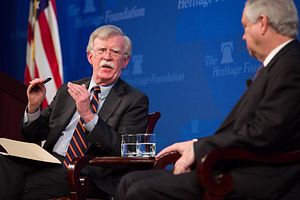The U.S. advisor to the president on national security affairs, John Bolton, has been a mainstay on American Sunday shows since the February 28 summit in Hanoi, Vietnam, with North Korean leader Kim Jong Un.
Bolton’s been making the most of these appearances to underscore the administration’s continued maximalist unilateral disarmament demands of North Korea — the very reason the summit fell apart.
But it doesn’t stop there for Bolton. This past Sunday, on a New York radio show, he confirmed China’s worst fears about U.S. intentions regarding the Ground-based Midcourse Defense (GMD) system — the U.S. national missile defense system, designed to protect the country from intercontinental-range ballistic missiles (ICBMs).
“China is building up its nuclear capacity now,” Bolton said. “It’s one of the reasons why we’re looking at strengthening our national missile defense system here in the United States.”
With that one sentence, Bolton not only contracted the Trump administration’s 2019 Missile Defense Review, which makes clear that Russian and Chinese ICBMs are not the targets of U.S. GMD interceptors, but he also fed into the dynamics that have prompted great concern in Beijing.
The 2019 Missile Defense Review notes that “the United States relies on deterrence to protect against large and technically sophisticated Russian and Chinese intercontinental ballistic missile threats to the U.S. homeland.” That’s the way it’s been in official documents for a while: any suggestion to the contrary — that U.S. missile defense efforts are designed to guard against all ICBM threats — sparks an arms race.
Of course, Bolton’s remarks may not matter much anyway. Russian President Vladimir Putin already explicitly cited U.S. withdrawal from the 1972 Anti-Ballistic Missile Treaty in 2002 as the reason for Russia’s new cornucopia of strategic systems, including an autonomous thermonuclear torpedo and a nuclear-powered cruise missile.
Making matters worse, Bolton isn’t even the most senior member of the administration to mangle the Missile Defense Review’s messaging on managing great power ICBM threats. That honor goes to Trump himself, who during a speech unveiling the document said that the U.S. would “ensure that we can detect and destroy any missile launched against the United States any time, any place.”
In Beijing, these kinds of statements are taken seriously. China, unlike Russia, is not at near-parity in terms of the size of its strategic nuclear arsenal. It possesses an arsenal just shy of 300 warheads to the United States’ 1,350 deployed strategic warheads.
By stoking concerns in China about U.S. missile defense plans, the United States will also harm the ability of its allies to accept additional theater missile defense deployments, too. The best case in point here is the 2016-2017 fiasco between China and South Korea over the latter’s acceptance of a Terminal High Altitude Area Defense (THAAD) battery.
Beijing has concerns that the powerful X-band radar accompanying the system could be networked into U.S. national missile defense, providing earlier and more precise targeting information on Chinese strategic warheads.
With comments like Bolton’s and Trump’s, these concerns in China won’t be going anywhere anytime soon.

































